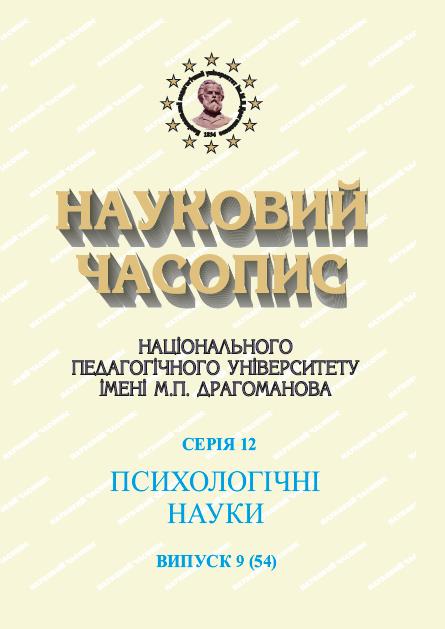ADVENTUROUS PEOPLE’S SELF-ESTEEM: FINDING DIFFERENCES
DOI:
https://doi.org/10.31392/NPU-nc.series12.2020.9(54).10Keywords:
adventurism, tendency to adventurous behavior, self-treatment, property of personality, quantitative analysis, qualitative analysis.Abstract
This article presents the results of the study of the of individuals’ self-esteem with different levels of adventurousness. The researches on the definition of such phenomena as «adventurism» and «self-attitude» were analyzed. The adventurism as a complex personality property is viewed from the stance of a continuum-hierarchical approach to personality structure. The urgency of developing the problem is connected with the need to study the properties of personality that require the identity of a brave, fast, and sometimes risky actions in conditions of high uncertainty. Such personality trait is the tendency of a person to adventurous behavior. We assumed that an adventurous person, according to the literature, has a positive attitude to oneself. For empirical testing we chose the original psychodiagnostic «Test-questionnaire to define the tendency to adventurism» (AVANT–1)» by O. Sannikova, O. Sannikov, N. Melenchuk and the method of «Test-questionnaire person self-attitude» by S. Pantileiev and V. Stolin. The statistically significant correlations of the indicators of adventurism and self-attitude has been determined. Qualitative analysis including the method of asses and profiles has allowed to study the psychological peculiarities of the self-attitude of persons with a different level of adventurism. It is shown that individuals with a low level of adventurism in this sample have a tendency to greater self-acceptance, the approval of themselves in general and a more positive attitude towards themselves. Persons with a high level of adventurism are characterized by low values of self-attitude and the absence of negative emotions towards their self-image. The representatives of a group of people with a high level of adventurism are not ready to put themselves in the guilt of their mistakes, failures, shortcomings and are not prone to selfincrimination.
Thus, in this article the assumption is proved that the adventurous person, although with a lower level than not adventurous persons are characterized by positive selfattitude, self-understanding, self-respect, autosympathy, arrogance.
References
- Bodalev, A.A., & Stolin, V.V. (2002). Obshchaia psikhodiagnostika [General psychodiagnosis].: Rech [in Russian].
- Kirillov, L.A. (1992). Osobennosti samosoznaniia lits s aktsentuatsiiami kharaktera [Features of self-identity of persons with accentuations of character]. Extended abstract of Candidate’s thesis. Moskva [in Russian].
- Kolyshko, A.M. (2004). Psikhologiia samootnosheniia [Psychology of self- attitude]. Grodno: GrGU [in Russian].
- Kochetkova, T.V. (2007). Spetsifika vidov samootnosheniia lichnosti v zavisimosti ot vyrazhennosti emotsionalnykh i kognitivnykh komponentov [The specifics of the types of self-relationship of a person, depending on the severity of emotional and cognitive components]. Extended abstract of Candidate’s thesis. Khabarovsk [in Ukrainian].
- Leongard, K. (1989). Aktsentuirovannye lichnosti [Accented personalities]. Moskva : Feniks [in Russian].
- Melenchuk, N.I. (2016). Psykholohichni chynnyky skhylnosti osobystosti do avantiurnoi povedinky [Psychological factors of propensity of the individual to adventurous behavior]. Candidate’s thesis. Odesa [in Ukrainian].
- Pantileev, S.R. (1991). Samootnoshenie kak emotsionalno-otsenochnaia sistema [Self-attitude as an emotional-evaluative system]. Moskva : Izd-vo MGU [in Russian].
- Sannikova,P. (2003). Fenomenologiia lichnosti: Izbrannye psikhologicheskie trudy [Personality Phenomenology: Selected Psychological Works]. Odessa : SMIL [in Ukrainian].
- Sannikova, O.P., Sannikov, O.I., & Melenchuk, N.I. (2015). s. Psykhodiahnostyka avantiurnosti: «Test-opytuvalnyk skhylnosti do avantiurnosti» (AVANT-1); «Samootsinka komponentiv avantiurnosti» [A.s. Adventurous Psychodiagnostics: «Test-questionnaire to define the tendency to adventurism» (AVANT-1); «Self-Assessment of Adventure Components»]. Zaiavka № 60141; reiestrats. № 59701 [in Ukrainian].
- Timofeeva, I.Iu. (2005). Avantiurizm v russkoi kulture kontsa XVII - pervoi chetverti XIX veka [Adventurism in Russian culture of the end of the XVII - the first quarter of the XIX century]. Candidate’s thesis. Komsomolsk-na-Amure [in Russian].
- Melenchuk, N. (2017). Individual Psychological Peculiarities of Adventurousness According to Emotional Type. Наука і освіта, 7, 130-135. https://doi.org/10.24195/2414-4665-2017-7-20 [in Ukrainian].

